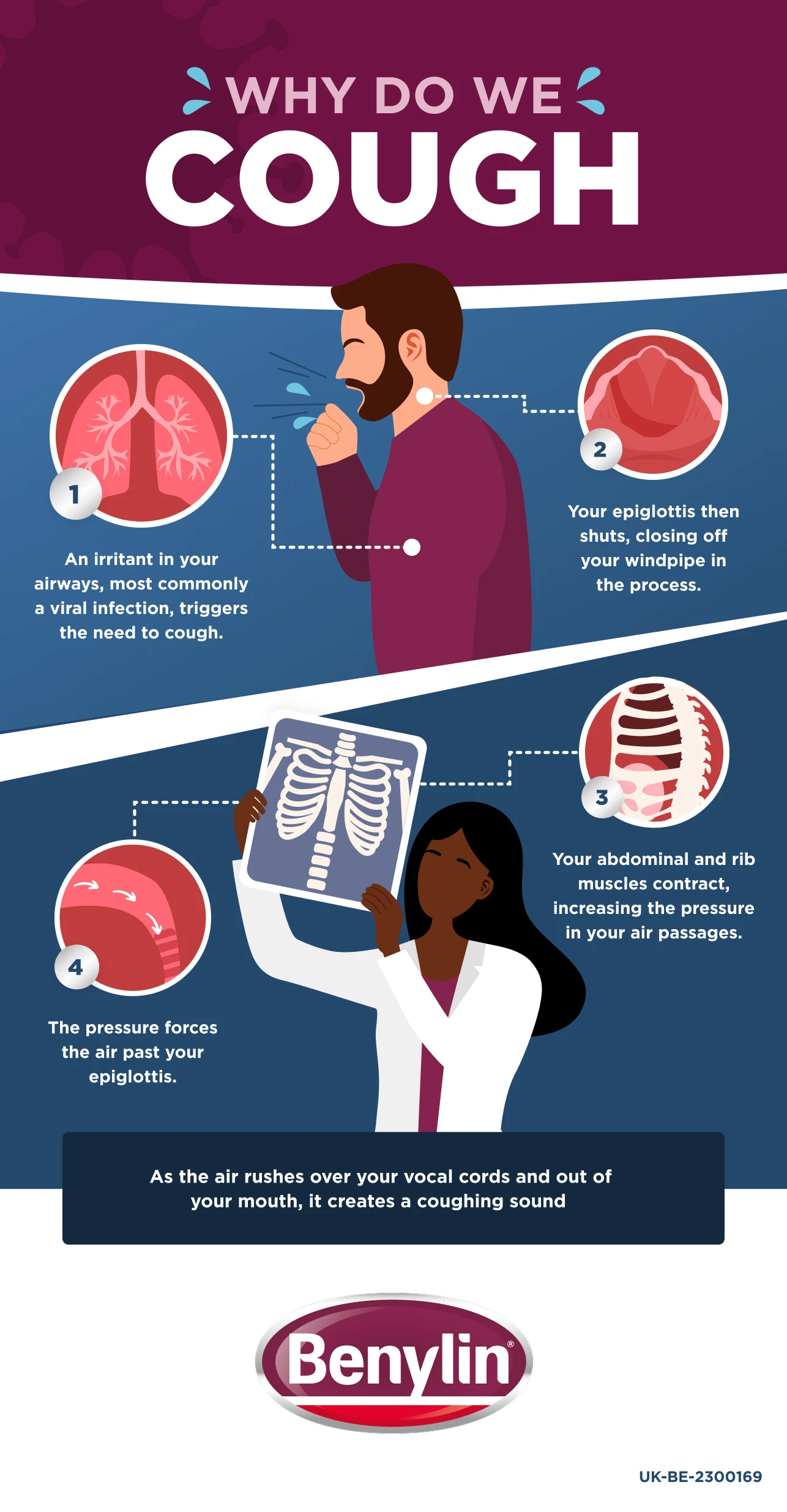A cough helps to clear out irritants, such as dust, germs, and mucus from your throat and airaways. Often, we can’t control when we cough – it’s spontaneous, and is just your body’s way of getting rid of those irritants that shouldn’t be there.
Coughing can be a response to a wide range of health issues, such as allergies, asthma, acid reflux, and colds. However, external factors, such as cigarette smoke, strong smells, and drug side effects, can also make you cough.
Sometimes, cough symptoms may be a cause of annoyance. However, the reaction is all part of the body’s natural defence system and, in most cases, isn’t anything to worry about. Most coughs don’t require any treatment, and often get better on their own within a few weeks.
Here, we’ll be delving deeper into the reasons why we cough, alongside common causes and treatments.
In this guide:
What is a cough?
A cough is a type of reflex that helps to clear your throat and airways from irritants. It’s automatic, which means you often can’t control when you do it and it’s a normal way for your body to protect your lungs and airways by removing unwanted materials.
Think of it like blinking or sneezing. Both are just other ways your body protects you from unwanted particles entering your system, so it’s hard to stop them from happening. If something gets in your eye, you blink. If something irritates your throat or gets into your lungs, you cough.
Coughs can affect both adults and children, though are usually short-term problems. They’re often associated with having a cold or the flu, smoking, asthma, and allergies. Cough symptoms will usually go away once the irritants have left your body, or around 2-3 weeks if associated with a cold.
What causes a cough?
There can be many causes of a cough. It’s a good idea to understand the difference between a short-term and a persistent cough, and the different factors that can cause them. A short-term, or ‘acute’, cough, is usually caused by a temporary illness (such as a cold) or irritants (such as dust). It’s rarely a sign of something serious and will usually go away on its own within three weeks without the need for medical attention.
Meanwhile, a persistent cough can be more recurrent and long-term. You may find you experience flare-ups, and it could be caused by an underlying condition. If your cough has lasted more than three weeks, it’s usually considered persistent. If this lasts more than eight weeks, it’s called a chronic cough.
Potential causes of a short-term cough
So you know what to look out for, let’s take a look at some of the potential causes for a short-term cough.
An upper respiratory tract infection (URTI). This can cause irritation to the throat and sinuses. Examples of a URTI include a cold, flu , sinusitis, or whooping cough.
A lower respiratory tract infection (LRTI). A LRTI affects your lungs and lower airways. This can include infections like pneumonia or bronchitis.
Allergies. These can often flare up at certain times – for example, hay fever.
Dust particles or smoke. These particles can enter your airways and become irritants.
A short-term flare-up of a long-term condition. For example, asthma or chronic bronchitis.
Potential causes of a persistent cough
Persistent coughs may have slightly different causes. These can include:
Asthma. This is a long-term condition, which may also cause general shortness of breath.
Regular smoking. Smoking can incur something called a ‘smoker’s cough’.
A long-term respiratory tract infection (RTI). For example, chronic bronchitis.
Certain prescribed medications. Medication for high blood pressure or cardiovascular disease can include coughing as a side effect.
Bronchiectasis. This condition abnormally widens the airways in your lungs.
In rare cases, a persistent cough can be a symptom of more serious conditions like lung cancer or a blood clot. Please speak to your doctor if you’re concerned.
What happens when you cough?
A number of elements within your body work together to produce a cough. These include your lungs, windpipe, epiglottis (a flap of tissue found at the back of the throat), and rib muscles.
There are also a number of steps included in the process of coughing. These include:
First, your body gasps air into your lungs.
Next, your epiglottis shuts. This closes off your windpipe in the process.
Your abdomen, diaphragm, and rib muscles then contract. This increases the pressure in your air passages.
The pressure forces the air past your epiglottis, which quickly opens to let it past.
As the air rushes over your vocal cords and out of your mouth, it creates a coughing sound.
The ultimate goal of this process is to remove unwanted particles and materials, such as dust or mucus, out of your airways.
Common cough symptoms
Depending on the underlying cause, there are a few different types of coughs. Because of this, your cough symptoms may vary – everyone is different.
Let’s take a look at some of the different types of coughs and their main symptoms.
Chesty and mucus coughs. Chesty coughs are designed to remove irritants using mucus and phlegm. As a result, the main symptom is mucus or phlegm formation.
Dry and tickly coughs. These don’t produce phlegm and may feel like you have something in your throat. The main symptom is a dry or tickly feeling in your throat.
Children’s coughs. Children often get around six to eight coughs each year once they begin school. They might get a sore throat and their coughing might get worse at night.
Whooping cough. Whooping cough is a condition caused by a bacterial infection. It’s spread virally, through particles in coughs or sneezes, and may require antibiotics. Whooping cough symptoms may be a little more severe than a ‘regular’ cough. They can include:
Cold-like symptoms, such as a sore throat
A ‘whooping’ sound
Sweating and vomiting
A bluish-purplish tinge in children.
How can I treat my cough?
Short term coughs and colds usually don’t require treatment and will often clear up within around three weeks. However, if you want to alleviate your cough symptoms, there are a few things you can do. These include:
Resting and drinking lots of fluids.
Staying at home if you don’t feel well enough.
Taking paracetamol or ibuprofen to help relieve any pain.
Trying home remedies, such as hot lemon and honey. Do note, this isn’t suitable for children under one.
Taking specialist cough syrups, medicines, or sweets. Speak to your pharmacist for advice on how they work, and to make sure they’re suitable for children.
Want to know more? Learn more about adult and children’s cough relief options from Benylin®.
Persistent coughs that have lasted for three weeks or more may require treatment from your GP.
You should see a GP if:
You've had a cough for more than 3 weeks (persistent cough)
You're losing weight for no reason
You have a weakened immune system – for example, because of chemotherapy or diabetes
Ask for an urgent GP appointment or get help from NHS 111 if:
Your cough is very bad or quickly gets worse – for example, you have a hacking cough or cannot stop coughing
You feel very unwell
You have chest pain
The side of your neck feels swollen and painful (swollen glands)
You find it hard to breathe
You're coughing up blood
Causes of a cough: FAQs


Find The Right Product For You
Discover products from the Benylin range that help treat your symptoms!

